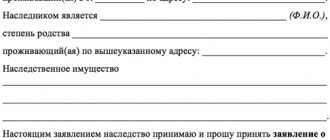Inheritance disputes are disagreements between potential heirs regarding property due to them. Often, applicants for inheritance cannot find a mutually beneficial solution to such a conflict. It becomes possible to resolve the dispute only through legal proceedings.
ATTENTION : our lawyer for inheritance cases in Yekaterinburg will help resolve the inheritance dispute: professionally, on favorable terms and on time. Call today!
What are the types of hereditary disputes?
Disagreements that arise between heirs can be divided into the following three types:
- disputes about the right to inheritance;
- disputes about challenging a will by inheritance;
- establishment of legally significant facts through special proceedings.
Among the disputes about the right to inheritance, the bulk consists of court proceedings on the division of property, on the allocation of a mandatory share, as well as on the restoration of the period for accepting an inheritance.
A dispute over challenging an inheritance involves a conflict between heirs under the law and under the will. As a rule, heirs by law apply to the court to have the will declared invalid. This category of dispute also includes the procedure for declaring heirs unworthy.
Disputes of special proceedings are related to confirmation of the right to inheritance, that is, with the establishment of legally significant facts in the procedure of special proceedings. This category includes court consideration of applications to establish the fact of family relations, to recognize a citizen as deceased, to actually accept an inheritance, and some other categories of cases.
Main conclusions
The right to an obligatory share in the inheritance of residential real estate is exercised with some specific features. If a conflict arises, the possibility of transferring the disputed part of the real estate to the applicant and the fact of residence in it during the life of the testator are taken into account.
In addition, the property status of the person wishing to receive the obligatory share cannot be discounted. Only with such a set of facts is it possible to make a fair judicial decision.
Author: Oleg Vladimirovich Roslyakov, source sud-isk.ru.
Pre-trial resolution of inheritance disputes
The best way to resolve any conflict is through negotiations between the warring parties. Inheritance disputes are no exception. Through diplomacy, the parties can quickly, unlike litigation, find a mutually beneficial solution. An additional incentive to come to the negotiating table is the opportunity to avoid legal costs. In an inheritance dispute, the opponents are most often relatives, which also has a positive effect on the peaceful settlement of the issue and increases the chances of concluding an agreement on the division of the inheritance.
Currently, methods of pre-trial resolution of conflicts between citizens are becoming widespread. One of these methods is the mediation procedure. A mediator is a professional mediator who, as a rule, has special knowledge in the field of psychology and law. Its main task is to resolve all controversial issues between the parties by concluding a mediation agreement.
In order to resolve the conflict, the warring parties have the right to apply to an arbitration court, which, unlike a state court, allows the dispute to be resolved in a shorter period of time, additionally resolving issues that cannot be resolved by a court of general jurisdiction (establish the date of entry into force of the decision, determine order of execution of the decision, etc.).
Disputes regarding inheritance cases in court
Despite the efforts taken by the state to reduce the burden on the courts and the spread of pre-trial methods for the peaceful resolution of conflicts, judicial statistics, on the contrary, only indicate an increase in the number of inheritance disputes in the courts. This is due, firstly, to the authority of the state body, and secondly, to the fact that questions about establishing legally significant facts are resolved only by the court.
When applying to the court, the applicant needs to justify his right to the inherited property, therefore, when drawing up a statement of claim, all the constituent elements must be observed. The claim includes the following main parts:
- introductory _ The “header” of the document indicates the name of the court, the price of the claim, information about the plaintiff, testator and other participants in the process. The peculiarity of inheritance cases, in contrast to other categories of civil cases, is that the court involves as co-defendants all persons entitled to the inherited property, regardless of the indication of these persons by the plaintiff in the submitted application;
- descriptive _ This part of the application indicates the grounds for inheritance - family ties, will, and also describes all the circumstances that led to the application to the court;
- pleading . In this part, a request is made to the court to make a specific decision on the submitted application.
At the end of the claim, documents are attached confirming the plaintiff’s correctness when applying to the court.
USEFUL : follow the link to read our proposal for filing a claim in court within 24 hours, and also watch the video
Typical problems associated with the grounds for invalidating wills
The most common reasons for invalidating a document are defects in form and subjective aspect .
The issue of the testator's incapacity in these cases comes first . In practice, both the courts, the notary, and lawyers recognize that such cases are the most common.
On June 5, 2010 , changes were made to the legislation on notaries; it acquired clearer rules, which stipulate that when concluding transactions, notaries are obliged to ascertain the legal capacity of citizens. It should be noted that the notary is also quite limited in his ability to verify the ability of the testator at the time of concluding the transaction to understand the meaning of his actions and manage them.
A transaction made by an incapacitated person will most likely be declared invalid upon the claim of persons whose rights and interests were grossly violated as a result of the preparation of the document (Article 177 of the Civil Code of the Russian Federation). Challenging on this basis, as already noted, is the most common, because the mental state of the testator at the time of drawing up the will can only be determined by making a post-mortem forensic psychological examination. The peculiarity is that the heirs file a claim and indicate as a basis that the testator at the time of drawing up the document did not understand the significance of his actions and could not direct them .
The Supreme Court of the Russian Federation has more than once discussed the issue of the validity of the document and how the examination can influence the court’s decision. In one of the acts in such a case, the court concluded that the power of attorney was invalid and the will was recognized as valid, both transactions being carried out by the same citizen . When assessing the expert’s conclusion, an important factor is that “with the greatest degree of probability it can be assumed” that the citizen could not understand the meaning of his actions and could not control them at the time of drawing up the document. The Supreme Court does not support the decision of the trial court, since the latter unreasonably ordered a comprehensive psychological examination to obtain categorical conclusions.
The court, which has examined numerous and contradictory evidence regarding the understanding of actions and the ability to direct them by the testator, may consider insufficient and send the case for re-examination (findings of the Sverdlovsk Regional Court of August 14, 2008 in case No. 33 -6434/2008).
There is a need to dwell on the consideration of problems associated with the grounds that relate to non-compliance with the provisions of Art. 1125 of the Civil Code of the Russian Federation. A will is invalid if , for example, the requirements for its form are not met . These include the following violations.
- The will was written down by a notary from the words of the citizen who bequeathed the property, and before signing it was not read by him or was not read by a notary , if the testator could not independently familiarize himself with the final text, and the reason for this was not indicated, which contradicts paragraph 2 of Art. 1125 of the Civil Code of the Russian Federation.
- The will was not signed by the testator with his own hand and the reasons why he could not sign the document on his own were not indicated; or the name, surname, patronymic or place of residence of the person who, at his request, signed the will in his place is not indicated, which is contrary to paragraph 3 of Art. 1125 of the Civil Code of the Russian Federation.
- The presence at the signing of a document as a witness of a person whose rights to property relate to this document, which contradicts the requirements of paragraph 2 of Article 1124 of the Civil Code of the Russian Federation.
As for these violations, in judicial practice great importance is attached to fulfilling the requirements arising from the norms of paragraphs 2 and 3 of Art. 1125 of the Civil Code of the Russian Federation. doubtful if they are not personally signed by the testator or are not read to him before signing. This article also does not exclude, but on the contrary, accepts the presence of a witness when drawing up such a will.
There are cases when the court does not consider some of these violations to be a reason to invalidate a document. Thus, in the Chelyabinsk Regional Court, the judge concluded that such a violation is not significant and cannot serve as a basis for declaring the document invalid, since other rules for drawing up the document were observed and the violations committed do not allow one to doubt the validity of the will of the testator (ruling dated June 25, 2010 in the case No. 33-5279/2010).
Clause 3 of Art. 1131 of the Civil Code of the Russian Federation directly states that minor violations in the preparation of a document, its signing and certification cannot serve as a basis for recognizing the invalidity of the document , since they do not affect the understanding of the will of the testator. But this rule of law does not specify which violations can be considered minor. Therefore, in each specific case, the courts independently analyze and establish the fact of a violation. This can be seen from their judicial acts.
Example In one of the cases considered by the court, the following was stated: the arguments of the cassation statement that the disputed document (testament) is an invalid transaction, since it contains corrections, are not grounds for declaring the document invalid. These corrections do not in any way affect the will of the testator, since none of those citizens who were questioned in the trial of witnesses indicated that he did not want to bequeath his property to the defendant (ruling of the regional court in the city of Chelyabinsk dated March 14, 2011 according to case No. 33-2744/2011).
This approach is almost impossible to agree with, since the testimony of witnesses concerned the intentions of the testator and was used by the court to interpret the document and in deciding the dispute about the validity of the document. The court did not give any assessment to the cassator’s arguments that, due to corrections in the will, it was unclear what part of the residential premises the testator was ready to dispose of.
Limitation period for inheritance disputes
The statute of limitations for inheritance disputes is 3 years, but when filing a statement of claim, the beginning of this period should be taken into account. According to paragraph 1 of Art. 200 of the Civil Code of the Russian Federation, the limitation period is calculated from the moment when the person learned or should have learned about the violation of his right. In applications for disputes arising from inheritance legal relations, this moment will be considered the day of acceptance of the inheritance, therefore, it is from this day that the countdown of the three-year period will begin.
Additionally, it is worth noting that the legislator limited the period for accepting an inheritance to six months, thus, a person who considers his property right to be violated must actually file a claim with the court within the period allotted for accepting the inheritance. Otherwise, the potential heir will be forced to first restore the deadline for accepting the inheritance (for example, by proving the actual acceptance of the inheritance). To do this, you will need to apply to the court with an appropriate petition, after which the heir will be able to express his disagreement regarding the inherited property in a statement of claim.
NOTE : you can enter into an agreement with us not only for representation in court, but also for registration of an inheritance with a notary on a turnkey basis
Jurisdiction of inheritance disputes and state duty
Disputes regarding inheritance are subject to the jurisdiction of courts of general jurisdiction. Statements of claim arising from inheritance legal relations are sent to the district court at the defendant’s place of residence. If a dispute arose about the right to several real estate objects located in the jurisdiction of several district courts, then the application is submitted to the court at the location of one of the objects at the place where the inheritance was opened. If there are no real estate objects of the testator at the place of opening of the inheritance, then the claim may be brought at the location of any object.
An inheritance dispute to establish legally significant facts is subject to consideration in the court at the place of residence of the applicant.
The amount of the state fee when filing an application in court for this category of cases depends on the procedure for considering the dispute. For production in a special manner, you will need to pay a state duty in the amount of 300 rubles. To file a claim regarding property subject to assessment, you must pay a state fee depending on the value of the claim. The state duty will be 5,200 rubles. + 1% of the amount exceeding RUB 200,000. In order not to make a mistake in the amount of the state fee, the best option would be to find out the amount of the fee directly from the court itself before filing a claim.
In such cases, the law requires the establishment of a legal fact in court.
During his lifetime, the testator could begin the process of registering property as a property, but not have time to complete this process. For example, an application for privatization of a residential premises was submitted, but at the time of death, ownership had not yet arisen. This situation is the basis for filing a lawsuit to include property in the inheritance mass.
The same judicial procedure can take place when inheriting property that is in common joint ownership, that is, without allocating shares.
Assistance from an inheritance lawyer
Inheritance disputes are among the most complex cases in civil proceedings. They require careful preparation, excellent knowledge of legislation and judicial practice.
The complexity of such cases is added by the protracted nature of the judicial proceedings, as well as the family connection of the parties to the conflict.
Law Firm “Katsailidi and Partners” recommends that in such cases you seek the help of a lawyer for inheritance disputes. Professional legal assistance in inheritance disputes mainly consists of protecting the interests of the principal, as well as the most painless outcome for the parties.






